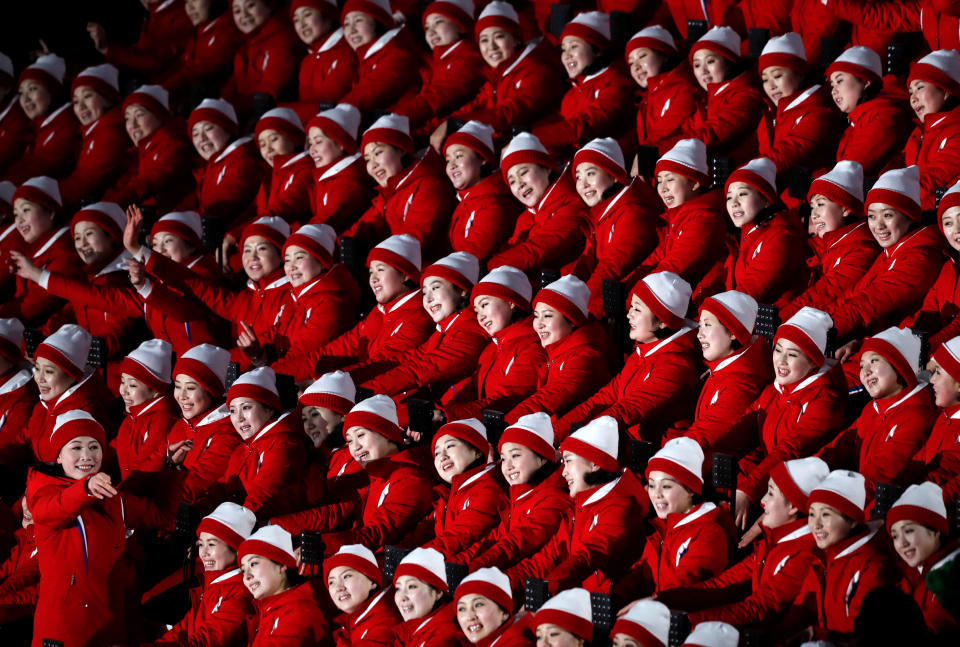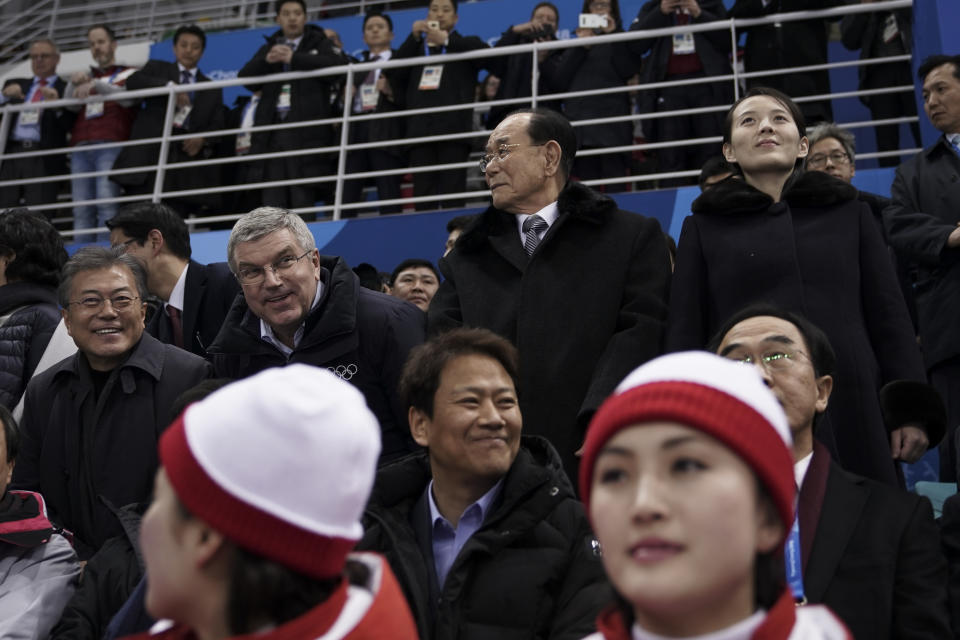Why you shouldn't buy North Korea's Olympic charm offensive
PYEONGCHANG, South Korea — North Korea has ambushed the Olympics, unleashing a charm offensive with cheerleaders and a dictator’s sister and olive branches to enemies near and far.
Don’t buy it.
That’s the message from Suki Kim, an author who went undercover in North Korea in 2011, posing as an English teacher for the upper class. She finds the world’s reaction to the first few days of the Olympics unsettling to say the least.
“This whole charm offensive, I don’t find any of it charming,” she said by phone on Tuesday after flying back to the States from Seoul. “The world’s media has been complicit as far as making it seem charming. In plain words, it’s propaganda.”
Kim wrote about her experiences in the New York Times bestseller, “Without You, There Is No Us.”
“I went there five times, lived there undercover,” she said. “They are masters at propaganda and lying all the time. It’s hard to get at the heart of the place. It’s buried in lies, layers of lies. The biggest mistake is assuming it works the same way as the rest of the world. There’s a reason no one goes in and no one goes out.”
Part of the North Korean strategy has involved women. Pretty women, to be exact. There are cheerleaders at the Olympic events where North Korean athletes are playing, and they are young and energetic and in constant grin. But Kim warns that the West views this through the prism of our own cheerleaders, who emote as a way to convey individual joy. To Kim, these cheerleaders are forced propagandists as well.

“This is a regime that induced slavery,” she said. “It’s not as if they’re American cheerleaders. None of them are there voluntarily. None of them.”
And that leads us to Kim Jong-un’s sister, who attended the Opening Ceremony and cut a mysterious figure that the cameras were drawn to. One American headline credited her for “stealing the show.” The accompanying story said she was “seen by some as her brother’s answer to American first daughter Ivanka Trump.”
But whatever issues one may have with the American president and his daughter, Kim and his sister are not parallel. According to the site Human Rights Watch, “A 2014 U.N. Commission of Inquiry found that abuses in North Korea were without parallel in the contemporary world. They include extermination, murder, enslavement, torture, imprisonment, rape, forced abortions, and other sexual violence. North Korea operates secretive prison camps where perceived opponents of the government are sent to face torture and abuse, starvation rations, and forced labor.”
“She’s not like Princess Diana,” said Suki Kim. “She’s not Ivanka. She’s a part of a most brutal regime. We can’t even verify who she is married to. It doesn’t mean we don’t engage. But this extreme denial of the truth just to pretend she is a princess? Why? Because she is good looking?”
Part of the problem is that the West (and to some extent South Korea) expected the North Korean belligerence of the past several months, where Kim has made overtures about firing nuclear weapons at the U.S. mainland. President Donald Trump’s “Rocket Man” comments fed into that, and it was easy to imagine the tyrant as unhinged and unrefined. In fact, it’s the opposite. The North Korean hierarchy is extremely refined, to the point of complete control of its people and its messaging. Everything is scripted; nothing is left to freedom and whim. To those from around the world, it comes across as surprising and maybe reassuring. It should be neither.
It’s always alluring to consider the possibility of peace. The North and South have been in conflict for the better part of a century. No one wants armed conflict, which would be deadly at best and unfathomably ruinous at worst. So the idea of two nations marching together, joined by sport, is a tempting storyline to say the least. We all want sport to uplift; basically every story emerging from these Games is in that vein.
North Korea knows this, and its leadership has become adept at the push-pull of Western heartstrings. It exploits fear and it exploits hope.

“This [coverage] is all about North Korea, it’s all positive, and they just conducted a nuclear test,” said Suki Kim. “It’s shocking what they’ve been able to do. Everyone projecting they [the regime] would fall and they just hijacked the Olympics.”
And it was free. South Korea paid for all of these facilities, recruited all the volunteers, cooked all the food, drove all the buses. The rest of the world’s media outlets paid for reporters and cameramen to travel and cover these events. The cheerleaders were beamed around the globe.
In some circles, U.S. Vice President Mike Pence was panned for not playing along.
So what happens after the Games? Consider what took place a decade ago. After nuclear disarmament talks in 2007, the New York Philharmonic was invited to North Korea to play a concert. It was considered a breakthrough – an example of music rising above geopolitics. Then-leader Kim Jong-il did not attend, but he did send dignitaries. The North Korean culture minister expressed hope for “a big step toward bilateral cultural exchange between the two countries.” The Republican administration was skeptical. “At the end of the day, we consider this concert to be a concert,” said then White House press secretary Dana Perino, “and it’s not a diplomatic coup.”
The concert took place nearly 10 years ago to the day: Feb. 26, 2008. It played well in the world’s media. It played well in North Korea. “It was seen by some as an opening for warmer relations with the United States,” wrote the New York Times, “which North Korea has long reviled.”
In the path toward reconciliation and disarmament, we can look back and see what it accomplished:
Nothing at all.
More Olympic coverage from Yahoo Sports:
• Now finally an Olympian, Adam Rippon hope reach extends beyond gay community
• How Jamie Anderson beat the wind to win Olympic gold
• How Russia’s Olympic fans are making a mockery of the IOC
• The NHL’s best (Zamboni drivers) are in PyeongChang, no matter what people tell you
• Polish luger loses protective visor, makes run anyway

